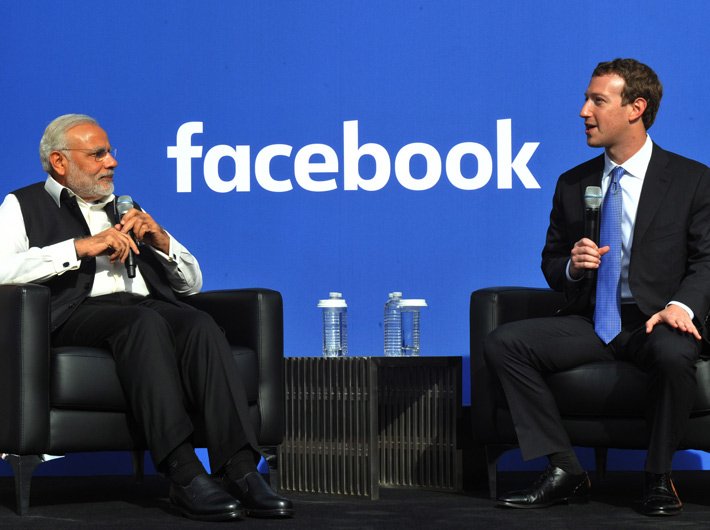Modi at Social media giant's event, talks of the power of the mediaum and tells world leaders to connect
Facebook founder Mark Zuckerberg has had his belief in his company reinforced by India. This was confessed by Zuckerberg himself as he hosted prime minister Narendra Modi on sunday at the headquarters of Facebook in California.
Zuckerman told of a time when the company was going through what he called a "rough patch", eis late mentor, Apple boss Steve Jobs advised him to travel to India. "Seeing the people and how people connected, reinforced what we were doing and is something I've always remembered," he said.
Both Zuckerberg and Modi shared emotional moments during the discussion.
After Mr Zuckerberg pointed out his parents in the audience, Mr Modi welled with tears speaking about his own. He recounted stories from his childhood in a poor family, selling tea at a railway station and doing hard chores to earn money. "It is hard to imagine that a tea seller has actually become the leader of the world's biggest democracy," he said.
At the outset Modi hailed the political power of social media, as he visited the headquarters of Facebook in California.
"To leaders all over the world: you are not going to gain by running away from social media," he said during a question-and-answer session.
Modi also used the occasion to promote his Digital India drive for technological development.
Zuckerberg moderated the hour-long session.
"The strength of social media today is that it can tell governments where they are wrong and can stop them from moving in the wrong direction,'' Mr Modi said in Hindi at the meeting in Menlo Park.
"We used to have elections every five years and now we can have them every five minutes," he added.
Modi, 65, regularly uses both Facebook and Twitter to communicate with millions of his followers.
Modi's Q&A was decidedly more A than Q, as of 40,000 questions submitted, only three were asked. The prime minister even appeared to cry. An elderly Indian lady told me it meant he "just like us".
Those who see Modi less favourably say that was exactly its intention, a staged display designed to build his reputation as a man of the people.
Mark Zuckerberg, keen as ever to expand Facebook's user base and global influence, talked up the prospect of connecting a billion more Indians to the internet. Modi said he hoped his motivations weren't purely about Facebook's bank balance.
Modi said he wanted to connect all India's villages to the internet - around a billion Indians currently lack internet access, dwarfing the roughly 300 million connected Indians.
Facebook's internet.org project, which offers free access to a bundle of mobile phone web apps, is promoted by the company as a way of getting millions in the developing world online.
But it has drawn criticism in India, accused of favouring Facebook and its commercial interests over local online services. Mr Zuckerberg has promised to open the scheme to a wider range of apps and services.
The prime minister also spoke about the need to bring more women into "decision-making".
"If we want to achieve our economic goals, we cannot do that if we imprison 50% of our population inside their houses," he said.
Silicon Valley tour
Modi's tour of Silicon Valley included meetings with top officials from Apple, Google and other companies.
US tech companies see India as a big commercial opportunity, but want the country to reduce red tape. Mr Modi in turn is keen to encourage digital investment.
After meeting Mr Modi on Sunday, Sundar Pichai - the Indian-American head of Google - announced that the company would provide wifi access at hundreds of Indian railway stations.
On Monday, Mr Modi will attend the UN General Assembly in New York and is expected to hold talks with US President Barack Obama.
Zoho CRM - Affordable On-demand CRM
